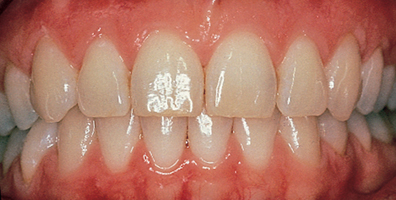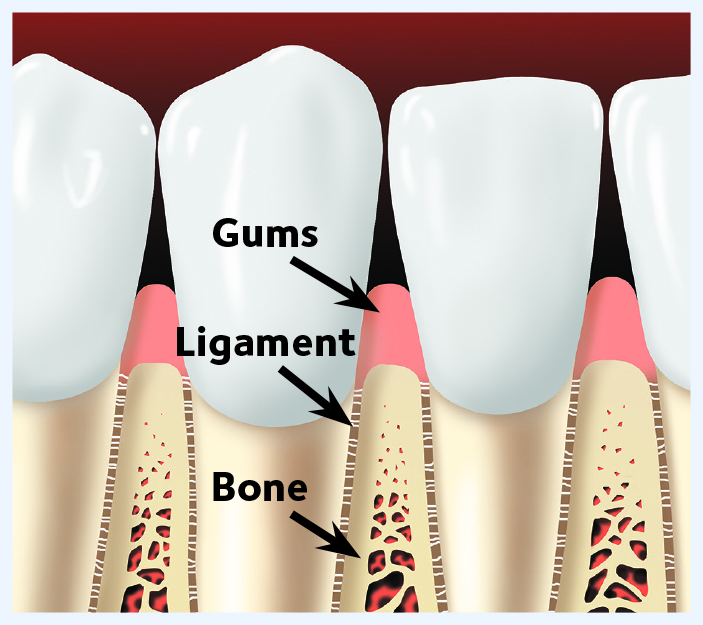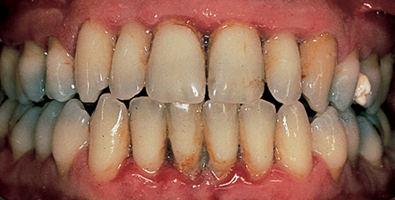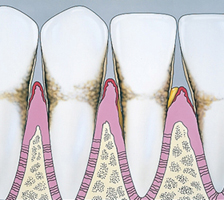The good news is that, together with the team at your Aspen Dental practice, you can take great care of your oral health and possibly help prevent other health issues.
Healthy Mouth, Healthy Body – Making the Connection
Your mouth is a window into the health of your body
Insight about your overall health can sometimes be seen in your mouth.
In fact, periodontal (perry-oh-DON-tal) — or gum — disease is common in people with chronic diseases like heart disease or diabetes. This brochure explains the connection between your oral health and your overall health.
What you should know about gum disease
Gum disease is an infection and inflammation that affects the tissues and bone that support your teeth. The infection is caused by the bacteria in plaque, a sticky film that’s always on your teeth. Your body reacts to the infection and your gums will become inflamed — red, puffy and swollen.
If left unchecked, gum disease affects the tissues and bone that support your teeth. It is the most common reason why adults lose teeth.
Gingivitis
When your body reacts to this infection and your gums are inflamed, this condition is called gingivitis (jin-ja-VY-tis), and it can lead to more serious types of gum disease. The good news about gingivitis is that it can be reversed.
If the gum disease is caught early enough (when it is gingivitis), you may simply need a professional cleaning. Your dental team can also give you advice for improving your daily oral hygiene.
Periodontitis
If gingivitis is not treated, it can turn into periodontitis (perry-o-don-TIE-tis). Periodontitis is usually not painful, but it can lead to bone loss.
Effects of Periodontal Disease
 |
 |
| Healthy gums and bone hold teeth firmly in place. | |
 |
 |
| Periodontitis happens over time, as plaque builds up along the gum line. Your body responds to the toxins that the bacteria produce by breaking down the gum tissues and bone around the teeth. | |
Warning signs of gum disease:
- gums that bleed when you brush or floss
- gums that are red, swollen, puffy or tender
- gums that no longer tightly hug your teeth
- bad breath that doesn’t go away
- pus between your teeth and gums
- feeling that your teeth are loose
- a change in the way your teeth fit together when you bite
- a change in the way your partial dentures fit
You may notice one or some of these warning signs, or you may not have any signs of gum disease at all. This is why it’s important to see your dentist regularly — treatment of gum disease is most successful when it’s caught early.
The Mouth-Body Connection
Certain chronic diseases are sometimes shown to raise your risk of gum disease. And, sometimes having gum disease is shown to raise your risk and severity of chronic disease. While it may not be clear whether one drives the other, some of the chronic diseases that commonly occur with gum disease are:
- arthritis
- diabetes
- emphysema
- heart disease
- high blood pressure
- liver diseases like the hepatitis C virus
- obesity
- stroke
Using tobacco raises your risk of gum disease
Using tobacco products of any kind (cigarettes, dip/chew, e-cigs, hookah, etc.) is a common risk factor for many chronic diseases including gum disease. Tobacco increases the risk of getting gum disease. The disease can also get worse the longer you use tobacco.
Many of the medications used to treat other diseases can affect your mouth by causing dry mouth. These include medications used to treat blood pressure, allergies, and pain. Dry mouth can increase your risk of tooth decay and gum disease.
This ADA educational message displayed by permission.

